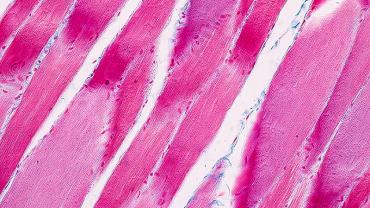
The relationship between the gut microbiome and age-related changes in health status has been a topic of interest for recent research. Studies indicate that shifts in the composition of the gut microbiome occur during the aging process. Profiles of the gut microbiome in older adults show decreased levels of certain beneficial bacteria, including some that produce butyrate, a short-chain fatty acid (SCFA). SCFAs have been shown to influence many aspects of human health, including the gut-brain axis, immune health, and cardiovascular health. These age-related shifts in gut microbiota may be due to dietary changes, decreased mobility, increased medication, other lifestyle changes, or physiological changes in stomach acidity and other aspects of digestion.
The progressive loss of muscle mass and function, or sarcopenia, is an increasingly common age-related pathology. Sarcopenia can lead to an increased risk of falls, fractures, and mortality.
Recent research has explored the connection between the composition of the gut microbiome and muscle integrity, referred to as the “gut-muscle axis.” A systematic review that was recently published in the Journal of Cachexia, Sarcopenia and Muscle by Liu and colleagues explored the relationship between sarcopenia and the gut microbiome in both human and animal studies. A total of 26 pre-clinical studies and 10 clinical studies were included in this systematic review. One study in aged mice showed an increase in endurance capacity and muscle strength and mass in the presence of supplementation with Lactobacillus and Bifidobacterium.
Other animal studies also investigated the gut-muscle axis. Analysis from four animal studies indicated a correlation between antibiotic use, dysbiosis in the gut microbiome, and muscle atrophy. Results from another study showed improvements in the functional ability of antibiotic-treated mice in the presence of acetate, which is a SCFA. A 6-week study investigated the relationship between exercise and the gut-muscle axis. Results of this study indicated improvements in muscle function parameters and increases in fecal butyrate levels.
Some clinical studies observed a correlation between age-related muscle loss, physical performance, and the relative abundance of biota in the gut microbiome. Additional studies indicated that a higher diversity of gut microbiota may be associated with improved muscle mass in young adult women.
An interventional study assessed the efficacy of prebiotic supplementation consisting of inulin and fructo-oligosaccharides on exercise performance in frail elderly individuals. Study results showed a significant improvement in grip strength and endurance capacity. A similar study involving supplementation with prebiotics in younger healthy adults showed improvements in anti-fatigue capacity in a dose-dependent manner.
Although more research will be necessary for conclusions regarding the potential relationship between the gut microbiome and muscle health, recent research indicates there may be a connection. A healthy gut microbiome may support healthy aging and other important functions in the human body.
By Colleen Ambrose, ND, MAT